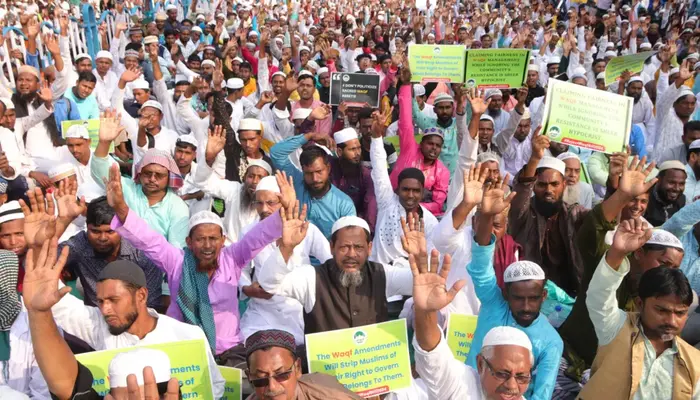India’s Waqf Reform Bill has sparked widespread concern among the country’s Muslim minority. The ruling Bharatiya Janata Party (BJP) says it aims to tackle corruption and mismanagement in the administration of waqf properties. However, many Muslims fear it threatens their constitutionally guaranteed rights over these religious and charitable endowments.
What Are Waqf Properties?
Waqf properties are assets donated by Muslims for religious or charitable purposes. These include mosques, schools, shrines, graveyards, and vast tracts of land. Once dedicated as waqf, the property becomes irrevocable and is governed by Islamic principles.
In India, nearly 1 million acres of land—double the size of Mauritius—fall under waqf. These properties are managed by state waqf boards, comprising Muslim members, and overseen by the Central Waqf Council (CWC). The governance framework has existed for over a century, with the Waqf Act of 1995 currently in force.
Read: Macron Vows Stability Amid France’s Political Crisis
Proposed Changes to Waqf Governance
The Waqf Reform Bill proposes over 40 amendments aimed at increasing state control over waqf bodies. Key changes include:
- Allowing non-Muslims to serve on waqf boards.
- Removing waqf experts from tribunals resolving disputes.
- Allowing tribunal decisions to be challenged in high courts.
- Revoking waqf status for properties without formal documentation, even if used as waqf for centuries.
These reforms also shift governance from waqf boards to state governments, significantly reducing the autonomy of Muslim-managed institutions.
Why Are Muslims Opposing the Bill?
Critics argue that the bill could undermine the community’s control over its religious and charitable properties. They believe it will expose these endowments to disputes, legal challenges, and potential state encroachment.
One contentious proposal removes waqf protections for properties lacking official records, a condition common among assets dating back centuries. Legal scholars warn this could lead to the seizure of mosques, graveyards, and schools.
The bill also curtails waqf bodies’ power to file cases against encroachments, despite government data showing nearly 60,000 waqf properties have been illegally occupied.
Government’s Defense
The BJP asserts that the bill addresses corruption and inefficiencies in waqf management. Officials highlight the need for transparency and digitization to boost income from these assets, valued at over $14 billion.
They also claim the inclusion of non-Muslims on waqf boards aligns with India’s secular ethos. However, Muslim leaders counter that no other religious trusts face such interference.
Historical Context and Broader Implications
Waqf institutions have played a vital role in India’s Muslim community for centuries, supporting education, healthcare, and social welfare. Critics see the reforms as an attempt to erode these rights and polarize voters ahead of elections.
Legal experts warn the changes may weaken the administrative efficiency of waqf bodies rather than improve it. Muslim leaders demand reforms that address corruption without compromising community rights.
Future of Waqf in India
As the bill awaits further review in parliament, opposition groups and Muslim organizations continue to protest. They call for consultations with stakeholders to ensure reforms strengthen, rather than undermine, waqf governance. The outcome could significantly shape the future of these historic endowments and the rights of India’s Muslim minority.
Follow Day News on Google News, Instagram, YouTube, Facebook, Whats App, and TikTok for latest updates
